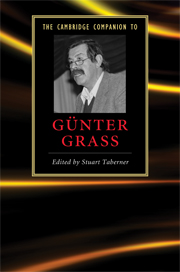Book contents
- Frontmatter
- Introduction
- 1 Biography as politics
- 2 Günter Grass’s political rhetoric
- 3 The exploratory fictions of Günter Grass
- 4 Günter Grass and magical realism
- 5 Günter Grass’s ‘Danzig Quintet’
- 6 Günter Grass and gender
- 7 Authorial construction in From the Diary of a Snail and The Meeting at Telgte
- 8 Günter Grass’s apocalyptic visions
- 9 Günter Grass and German unification
- 10 Günter Grass’s Peeling the Onion
- 11 Günter Grass as poet
- 12 Günter Grass and art
- 13 Günter Grass as dramatist
- 14 Film adaptations of Günter Grass’s prose work
- 15 Günter Grass and his contemporaries in East and West
- Guide to further reading
- Index
1 - Biography as politics
Published online by Cambridge University Press: 28 January 2010
- Frontmatter
- Introduction
- 1 Biography as politics
- 2 Günter Grass’s political rhetoric
- 3 The exploratory fictions of Günter Grass
- 4 Günter Grass and magical realism
- 5 Günter Grass’s ‘Danzig Quintet’
- 6 Günter Grass and gender
- 7 Authorial construction in From the Diary of a Snail and The Meeting at Telgte
- 8 Günter Grass’s apocalyptic visions
- 9 Günter Grass and German unification
- 10 Günter Grass’s Peeling the Onion
- 11 Günter Grass as poet
- 12 Günter Grass and art
- 13 Günter Grass as dramatist
- 14 Film adaptations of Günter Grass’s prose work
- 15 Günter Grass and his contemporaries in East and West
- Guide to further reading
- Index
Summary
Günter Grass’s memoir of his first thirty years, Peeling the Onion (2006), which he published a year short of his eightieth birthday, refocused attention on the autobiographical themes of his first three books, The Tin Drum (1959), Cat and Mouse (1961), and Dog Years (1963), which cover much of the same period and made him famous. Grass suddenly becomes a very autobiographical author when these are put together with his next set of prose fiction, which runs From the Diary of a Snail (1972) through to The Flounder (1977) and The Rat (1986), in which the authorial first person, or ‘author function’ to cite Rebecca Braun’s useful new term (see her chapter in this volume), orchestrates the polyphonic narratives. And in Local Anaesthetic (1969), The Call of the Toad (1992), and Too Far Afield (1995), the central characters are roughly Grass’s age at the time of publication (early forties in 1969, around seventy in the 1990s) and have a number of biographical features in common with him – both Starusch and Fonty have guilty wartime secrets, for instance. Yet it is not until the mid-1990s that autobiographical modes predominate in his literary writing, which follows a trend evident in his public statements from the beginning of the previous decade. The collection of one hundred stories which make up My Century (1999), for example, alternate between memoir and fiction in ways which may be seen as emblematic for his entire oeuvre.
- Type
- Chapter
- Information
- The Cambridge Companion to Günter Grass , pp. 10 - 23Publisher: Cambridge University PressPrint publication year: 2009
- 1
- Cited by



